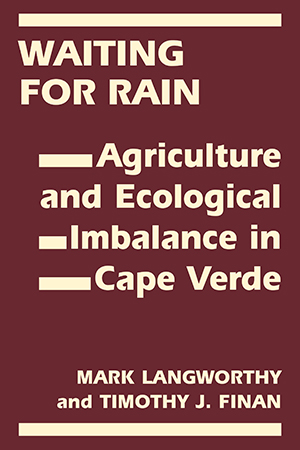Mark Langworthy and Timothy J. Finan
This ethnographic study of Cape Verde tackles critical development issues: the struggle for self–sufficient food security, the tension between agricultural production and natural resource sustainability, and the appropriate role of government policy in food production and natural resource management.
Cape Verde has moved into an ecological imbalance between the sustainable production capacity of the resource base and the size of the population seeking to derive a livelihood from agriculture. Within this context, the authors discuss the current agricultural practices and the forms of indigenous knowledge employed by Cape Verdean farmers; estimate the sources and magnitude of incomes among rural households; describe the natural resource base available to farmers, emphasizing the nature of constraints to production; and document the rules, both public and traditional, that define resource access and management. They also describe the past and present policies that Cape Verdean leaders have directed toward the problem of food production in a fragile ecosystem.
All the Sahelian countries face the challenge of balancing the demand for food (and income) with the capacity of the resource base to respond. Langworthy and Finan's assessment of agriculture in Cape Verde informs a thoughtful discussion of policy alternatives that may help relieve the current plight and avoid even more serious consequences in the near future.
Mark Langworthy is assistant research scientist in the Department of Agricultural Economics, University of Arizona. Timothy J. Finan is director of the university's Bureau of Applied Research in Anthropology.
"The authors' unblinking attention to a difficult situation makes this an important case for "sustainable development." This tightly written book, graciously free of both academic and "development" jargon, strikes this reader as something of a model for anthropological work directed toward the constructive application of our findings."—Nick Shorr, Sociocultural Anthropology
"The authors of this excellent book write about Cape Verde with care, affection and occasional exasperation.... The book presents a fascinating historical, social and agricultural review of Cape Verde and is of value for each of these aspects, representing one of the most recent and useful references on Cape Verde in the English language.... This book is far from optimistic in its assessment of the future for Cape Verde, but has done much to explain the current situation and outline the realistic options."—Phil Harris, Modern African Studies
"The best assessment of agriculture in Cape Verde in more than a generation... A well-organized and well-written case study ... [will] be read by anthropologists, economists, planners, and bureaucrats for years to come, and will be quickly added to required reading lists for graduate-level seminars in agricultural economics and applied anthropology."—Jonathan Mabry








